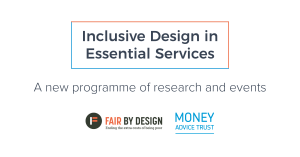A new programme of research, led by Fair By Design and the Money Advice Trust, explores the issue of inclusive design in credit, insurance, energy and other essential services markets. The Inclusive Design in Essential Services project will publish two reports in 2020 on how regulators and businesses can adopt inclusive design strategies in their work. 
Tag Archives: consumer rights
UKRN launches leaflet for vulnerable consumers seeking support services
 The UK Regulators’ Network has today launched an advisory leaflet to help ensure vulnerable consumers get the help they need to access essential services.
The UK Regulators’ Network has today launched an advisory leaflet to help ensure vulnerable consumers get the help they need to access essential services.
Produced through a collaborative effort between Ofgem, Ofcom, Ofwat, the ORR and the CAA, the leaflet highlights a range of free support services offered by utility, telecommunications and public transport providers.
The UKRN website gives details of how to get braille, audio and large print versions of the leaflet.
FCA wants financial services firms to stop charging expensive rates for calls
 The FCA is concerned that customers are being charged high rates to contact financial services firms and will consult with industry, consumer organisations and consumers to ensure customer calls are more affordable.
The FCA is concerned that customers are being charged high rates to contact financial services firms and will consult with industry, consumer organisations and consumers to ensure customer calls are more affordable.
According to FCA boss Martin Wheatley:
“We want to update our rules so that they best meet your needs as a customer. This means charges for both consumer helplines and complaint lines being capped at the cost of a basic rate call – so the same price as calling your neighbour or a family member on their landline”.
FCA will issue a consultation but wants firms to look at their practices in advance of this.
Consultation
The FCA’s consultation will propose the standardisation of the rules so that charges for consumer help, and complaint, lines are capped at the cost of a basic rate call. In a letter to consumer group, Which?, the FCA said it believed that the introduction of requirements in the Consumer Rights Directive, designed to ensure firms no longer charge a premium for calls, should apply to all financial services firms. The Directive requires firms to offer basic rate numbers for enquiries but at present, this does not apply to financial services firms.
In the same consultation the FCA will also look at a number of proposals to improve complaints handling by financial services firms including looking at complaints reporting and responding to the recommendations of the Parliamentary Commission on Banking Standards. The consultation will be published later this year.
Read more from FCA here.
Consumers International publishes agenda for fair mobile services
 On 12th March Consumers International (CI) published its Consumer Agenda for Fair Mobile Services ahead of World Consumer Rights Day (WCRD) on Saturday 15 March.
On 12th March Consumers International (CI) published its Consumer Agenda for Fair Mobile Services ahead of World Consumer Rights Day (WCRD) on Saturday 15 March.
In the run up to 15 March, consumer groups will be making one big call on mobile phone service providers to demand better services for the 7 billion mobile users across the globe.
Mobile rip offs are commonplace – from holidaymakers being stung by four figure roaming bills abroad, to customers tricked into paying to receive text messages. With smartphones set to function as a remote control for more and more aspects of our lives, consumer groups believe now is the time to ensure big mobile companies are held to account for unfair, substandard services.
CI’s demands
In consultation with consumer groups around the world, CI has drawn up a Consumer Agenda for Fair Mobile Services, which outlines what the consumer rights movement wants to see changed. This includes demands that telecom companies:
•provide consumers with access to an affordable, reliable service
•provide consumers with fair contracts explained in clear, complete and accessible language
•provide consumers with fair and transparent billing
•provide consumers with security and power over their own information, and
•listen and respond to consumer complaints.
Read more from CI here.
Consumer Rights Bill: written evidence
 Written evidence can be submitted until 13th March. Members might like to consider responding. See here for more, and details on how to respond. According to the guidance “Your submission should address matters contained within the Bill and concentrate on issues where you have a special interest or expertise, and factual information of which you would like the Committee to be aware. It is helpful if the submission includes a brief introduction about you or your organisation. The submission should not have been previously published or circulated elsewhere.”
Written evidence can be submitted until 13th March. Members might like to consider responding. See here for more, and details on how to respond. According to the guidance “Your submission should address matters contained within the Bill and concentrate on issues where you have a special interest or expertise, and factual information of which you would like the Committee to be aware. It is helpful if the submission includes a brief introduction about you or your organisation. The submission should not have been previously published or circulated elsewhere.”